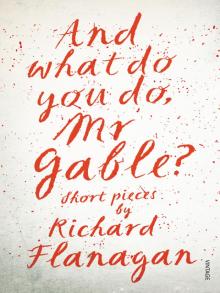- Home
- Richard Flanagan
The Unknown Terrorist Page 4
The Unknown Terrorist Read online
Page 4
After, when she only existed as a topic of conversation, people said there was always something different about her—not just who she was, but even how she looked. Her skin could seem almost alabaster, but she only had to walk outside on a hot day and it would turn cinnamon. Her black hair would take on an almost blue lustre under some lights. Sometimes she looked like a child, but on the table she would, in some intangible way, seem far more of a woman than anyone else in the room.
There was something about the promise of her body that made men happy to pay simply to sit in her vicinity, and the Doll was the dancer who almost always pulled the top dollars, no matter how bad the night. But men she mostly cared nothing for. Her sexual life, she said, didn’t amount to much:
“Does anybody’s?” she would say when the matter was raised. “A few girls, a few more boys. Nothing conclusive,” she once told Salls, as if love were a theory that needed proving.
She had an open gaze that met the eyes of others with a certain fearlessness that belied her private nature, and a sleepy, ironic smile that alone was often enough to drive men so crazy they would propose to her. To these Queensland resort developers, Victorian footballers and Sydney management consultants she would always reply:
“Are you completely out of your mind, my friend?”
And when that failed, have Billy the Tongan talk to them as they left the club.
She claimed that it was only about the money, but she had long since learnt that nothing is ever really about money—neither why the women danced, nor why the men watched. She hated the girls who tried to pretend it was some higher calling.
“You talk more shit than floats past Manly,” the Doll said to Maria after Maria had claimed it was “for our talent as dancers and our charm as entertainers” that men paid. “Men don’t care how an arse or tits wobble,” the Doll continued, “just as long as they’re wobbling their way, my friend.”
The Doll always said “my friend”; it was one of several tricks she employed to make herself appear different from the other girls. There were also her snobberies about clothes, which ran to the more expensive designer labels. She could turn up to work looking as though she were off to a corporate retreat.
Perhaps what the Doll was most successful at doing was keeping up a mystery about herself. She could disappear from the club for months at a time, giving neither notice that she was leaving, nor explanation when she returned, walking in as if it were just another weary day of work like the one before and the one to come.
In the absence of a sense that she had a life of any interest, she rarely spoke of herself. Stories began to cluster, and the Doll, discovering that the surest way of confirming a rumour was by denying it, began taking issue with the wilder tales in order to give them currency.
And so when asked if she had ever made a cast of her vagina and posted it to an ex-boyfriend, she said the tale was just so much crap. That there was no truth whatsoever that she had been Kylie’s arse, having her buttocks photographed for promotional shoots, standing in for the pop diva’s less appealing backside. She would put off anyone who wanted to search her stories or her heart with a laugh or a threat, mild but sufficient to compel others to leave her alone, but never enough to dispel the myths.
“Get off my arse,” she would smile. “It’s big, but it’s not that big.”
What was true? No one much believed the stories of the dead husband which was understood to be a joke that had grown up around one of her private party numbers that Ferdy had dreamt up. For Ferdy milked the exotic appeal of the Doll with various special routines: the Belle of Andalusia; the Harem Dancer; but most successfully for American marines and army groups, as the Black Widow.
There was even a special track for the show: Ferdy, who for a short time fancied himself as a DJ, had sampled “Flight of the Valkyries” off an Apocalypse Now DVD and added some explosions, screams, and a thudding rhythm that quickly cranked up to one hundred and sixty beats per minute as the Doll worked the crowd. She would appear in a long black dress and hijab, then slowly strip to crotchless black knickers and an open cup black bra.
The knickers’ split was tied with four black silk ribbons, each with a tiny fake pearl at their end. For fifty dollars, the Black Widow would untie a bow, and when each pearl-heavy ribbon had fallen, the Black Widow would, for a hundred, come up and open her legs wide for the man paying. And as she did so, Ferdy, using a data projector, would cover her flesh with swirling Arabic lettering, which he claimed to the audience was “the Black Widow’s most sacred book”, the Koran.
“It was a hell of an act,” Salls told yet one more tv crew the following Wednesday, recalling what she had seen some four years earlier. “Over the PA, Ferdy’d be hooling the crowd on: ‘What ordnance is the Black Widow carrying underneath?’ and that sort of stuff. I remember he’d also say something like, ‘You might think her fair, you might think her bright, but she’s as black as hell and as dark as night.’ I thought that was pretty good, and somehow it’s stuck in my mind ever since.”
14
Girls came and went all the time. The Doll wasn’t alone in being selective about her past; many had far better reason than she did to be careful about what they said. A Chinese girl, whom the Doll only knew as Fung, had turned up one night and worked at the Chairman’s Lounge for several weeks. There were rumours that she was a snakehead who had escaped from one of the Chinese brothels operating in anonymous CBD tower blocks, the chicken coops where Chinese girls, smuggled into Australia, lived and worked.
Whatever or whoever she was, Fung cultivated Ferdy, who had a thing for Asian women, and she quickly became something of a power within the club. She even rearranged a few of the Doll’s shifts, which pissed the Doll off no end. And yet her power was like the wind.
One night a Chinese businessman came to the club. He was middle aged, very polite, and impeccably dressed, with a very large Rolex. Fung had not yet arrived. He caught the Doll’s eye and asked her to tell Ferdy that Mr Moon had come to see him. He and Ferdy then sat in a corner, Ferdy ordered a Crownie and Mr Moon Johnnie Walker Blue Label on the rocks, and from a distance they appeared to be having an enjoyable conversation.
The Doll’s shift ended and she left. As she walked up Victoria Street she ran into Fung outside an Oporto takeaway. Fung was heading to work, having claimed as her own those profitable few hours around midnight on a Thursday night—pay night.
The Doll was about to tell Fung about Mr Moon, for without knowing she knew that somehow he and Fung were connected, and that the reason for his visit was not to enjoy the pleasure of Ferdy Holstein’s company. But she chose to say nothing. What business was it of hers, anyway? Besides, hadn’t Fung stolen some of the Doll’s lucrative shifts?
“Busy night?” asked Fung, her Chinese accent heavy, the words all sounding to the Doll wrongly tuned.
“Busy as,” the Doll replied. “North shore buck’s night just walked in as I was heading out.”
And for a second time she nearly told Fung about the neat, polite Mr Moon who even at that moment was sitting in the corner of the bar, drinking Johnnie Walker Blue Label, waiting. But why tell a slope who had stolen your best hours anything?
“A mob from a dentists’ convention worth getting to know,” the Doll continued breezily, all the time the name of Mr Moon so easily said and still unsaid, “and some westie labourers I’d be avoiding.”
The two women smiled thinly at each other, then walked on their separate ways. The Doll had reached the lights at an intersection when she turned abruptly and was about to yell out to Fung.
But it was absurd. What on earth would a middle-aged Chinese man have to do with Fung? And anyway, if there was some sort of shit going down, why get mixed up in it?
Having reasoned with herself in this contradictory way, the Doll stifled her cry, swung back around and headed home. She never saw Fung again.
The following night she heard that Fung had left the club with Mr Moon. A week passed and Fung had sti
ll not returned to work. A case of Johnnie Walker Blue Label arrived for Ferdy, a gift from Mr Moon. When some months later Fung’s body turned up in a cemented wheelie bin in the Hawkesbury River, everyone was both sad and a little terrified, not least the Doll.
But with the Doll, sadness was also a fear that somehow they would find Fung’s murderer and through him Mr Moon and through him back to her—to her who had said nothing. And mixed with her fear of the police, of Mr Moon should she ever see him again, was shame and anger. For in her heart the Doll felt she had somehow betrayed Fung and she could not stop thinking that she had cemented Fung in that wheelie bin as surely as whoever had thrown her into the Hawkesbury.
Then she would argue with herself that this was nonsense; that Fung might not have listened anyway. Or that maybe it had nothing to do with Mr Moon. Or that Mr Moon would have caught her come what may. That it was all absurd, for she had done nothing—yet wasn’t that exactly her crime?
But no one ever said anything, no police came, no questions were asked and nothing happened. Ferdy shared the Johnnie Walker Blue Label with special guests and a new Asian girl, and every time the Doll saw that bottle being brought out on a tray she felt queasy. For in her heart the same words—You killed Fung!—kept playing over and over.
The Doll only saw Mr Moon once more. He was on the tv news at an election fund raiser. He was shaking hands with the prime minister.
15
As she started pushing her buttocks further up and out and opening her legs, the Doll calculated she had made only four hundred dollars so far that evening, and that was including tips. Over her shoulder she caught the eye of a fat suit wearing Bono shades. Maybe he was an anal man, she thought, an idea that was quickly lost in a new calculation.
To make the night worthwhile she still needed another private show. With some luck she would get the customer to extend it into a second fifteen-minute session and pay the extra, thought the Doll, pressing her knickers in on her anus with a finger. That would give her that extra hundred bucks and, she felt, salvage the night.
“Ooooh,” moaned the Doll.
The room smelt like drying ammonia. Her lower back ached and her feet were on fire in the slut shoes all the girls had to wear—hot enough, as Salls used to say, to barbie a T-bone. The Doll turned, going from all fours to kneeling in front of him, trying to keep his wanky Bono shades fixed on her and only her. She slowly squeezed her own breast until her fingers closed on a nipple. She pinched it to make it tauten.
The fat suit extended a trembling hand toward her in which was a folded club tipping dollar. ‘Fuck all,’ thought the Doll, who was now up very close to him, saying,
“Why, thank you.”
She paused, counted three beats like the good professional she was, then in a lower voice said:
“You’re different. You’re a gentleman. I like dancing for gentlemen.”
The Doll spread her legs very slowly and, finally, with a knowing, complicit look that she sealed with a smile, lowered her gaze to her hand that she had begun running between her legs, while all the time thinking of a Louis Vuitton handbag she had seen spectacularly reduced to six hundred dollars. She could buy it tomorrow if the fat suit fell for her. It would make this shitful night worth it.
She let out an almost inaudible moan, a bizarre sound, really, but it often seemed to do the trick, and then pushed her hand underneath her knickers. She looked up, aiming to start reeling the suit in. But the Bono glasses were no longer fixed on her. Instead, they were focused on the next table, where Jodie was dancing.
The Doll wouldn’t give up. There was a Louis Vuitton bag at stake. Though it hurt, because her knees were bruised, she swung back around to being on all fours and once more began swaying her arse, hoping he might return his gaze to her. She swayed, her knees throbbed, her feet burnt, and still she kept on swaying, trying only to see herself striding down a street with her new handbag, imagining how good it would feel, how in control and purposeful she would look.
She would get him interested again, she would. Then when her turn on the table was finished she’d go and sit with him, go to work on him as she had learnt to work for the last five years, all with the aim of getting him to pay her for a fifteen-minute private show. She would give the patter only when it was needed, two ears open and mouth mostly shut, talking only when she had to, as she did with them all: enticing them to tell her their stories, their lives, their dreams; always getting them to talk about themselves, all their shit just pouring out and over her, and her saying,
“Yeah? Wow! Really? Incredible!”
Of late, most said they were mining executives. A few years ago they would have said they were property developers. Before that, dot com entrepreneurs. They were always making money. They always had a major project about to happen. The only constant thing the Doll could ever remember was herself saying, over and over:
“Yeah, wow, really, incredible.”
If they ever bothered to ask the Doll about herself, she would tell them that she was just working at the Chairman’s Lounge to help with her university fees, that she was a third-year medical student, single, and that she had never found the right man.
Sometimes when she danced up on the table and looked at all the lying going on down below, it seemed to her that the whole world was based on deception. Would any of these men go home tonight and tell their wives and girlfriends where they had been and what they had watched and how they were aroused? And yet everyone accepted that men came here and did such things, and that, after, the men would say nothing about it except to each other.
And so the Doll had come to believe that most of the world ran on such lies and deceptions, pretending to one thing when in truth being secretly desirous of something completely different; and she came to further believe that such deception and lies were perfectly acceptable.
And when Jodie and Amber at their shift’s end some-times—if the price was right and they felt like it—went with men to a hotel and turned tricks, they would pretend to the men that they were excited, and the men would pretend that the women weren’t pretending, and everyone knew it was all a lie. Deception mounted on deception, people were never who they seemed, told nobody of what they did, felt not what they said, and said nothing of what they felt. And all this was perfectly normal, so normal that when the Doll once raised it in conversation in the change room, Salls looked at her as if she had lost her mind, shook her head, and simply said:
“It’s all good.”
But when the Doll returned to the security of the brass pole at the centre of the table and turned back around, the fat suit was gone and it was hard to believe anything was good. The Doll held on to the pole, which at moments like this felt the only solid thing in her world, and slowly twirled around, scanning the room for a loaded man.
She spied a lone, middle-aged man coming down from the bar toward the tables. He had a short, keg-like build, wore a flash light-grey summer suit—it had to be Italian—and his face seemed somehow familiar. ‘A suit like that,’ thought the Doll, ‘will either tip with fifties or be tighter than a fish’s arse.’
16
Drink in hand, Richard Cody wandered deeper into the enveloping cavern of the club and found a tub chair close to a table on which a topless brunette was dancing. Her rounded arms and real thighs and splendid buttocks seemed a relief after the exposed musculature of the other women. As he took in the spectacle of the woman on the table he thought he recognised something familiar about her. Her name—was it Tiffany? Or was that the one at the Minx Club? Anyway, he thought, what did her name matter? She had a great arse.
He sat down and leant back and felt an odd and deep pleasure—all the sweeter for being familiar—take hold of him. He was thinking of how, for an eternity, people had thought paradise was somewhere else, whereas now it was here; of course, one had to pay, but then whatever pleasure you wanted was yours and you never needed to find out what their names were.
‘Ah,’ he thought, ‘h
ow sweet! How sweet!’
And he leant forward and raised his hand, holding out a twenty-dollar note in his extended fingers. Though a little taken aback when the Doll deftly plucked the note from his hand—for he had not intended to part with it quite so readily—he still felt momentarily enchanted; life no longer seemed so bad, and it was as if the world spun its peculiar way merely in order to ultimately please him.
If Richard Cody had no idea who she was, the Doll, now she could see him clearly, recognised him. He was Mr TV, Richard Cody. In the way of a pine furniture catalogue, Richard Cody was dully reassuring: always the same and telling you what you already knew. He made you feel comfortable. But he seemed a little unreal, even spooky, sitting there in front of her, tipping her, talking to her.
The Doll had heard from Maria that he had become something of a regular in recent months, though normally only on a Tuesday night early in the evening with a few tv executives. The Doll had never been working when he was there, and this was the first time she had seen him in the club. Jodie had turned a trick with him a few weeks before. She said that he had a flat fat cock like a crushed Coke can, and that it was so awful she charged him double, telling him it was her going rate.
“You’re a gentleman,” said the Doll, smiling as she slid the twenty-dollar note down the side of her knickers. “I like to dance for real gentlemen.”

 Death of a River Guide
Death of a River Guide Wanting
Wanting The Sound of One Hand Clapping
The Sound of One Hand Clapping And What Do You Do Mr. Gable?
And What Do You Do Mr. Gable? Gould's Book of Fish: A Novel in Twelve Fish
Gould's Book of Fish: A Novel in Twelve Fish First Person
First Person The Unknown Terrorist
The Unknown Terrorist The Narrow Road to the Deep North
The Narrow Road to the Deep North Gould's Book of Fish
Gould's Book of Fish